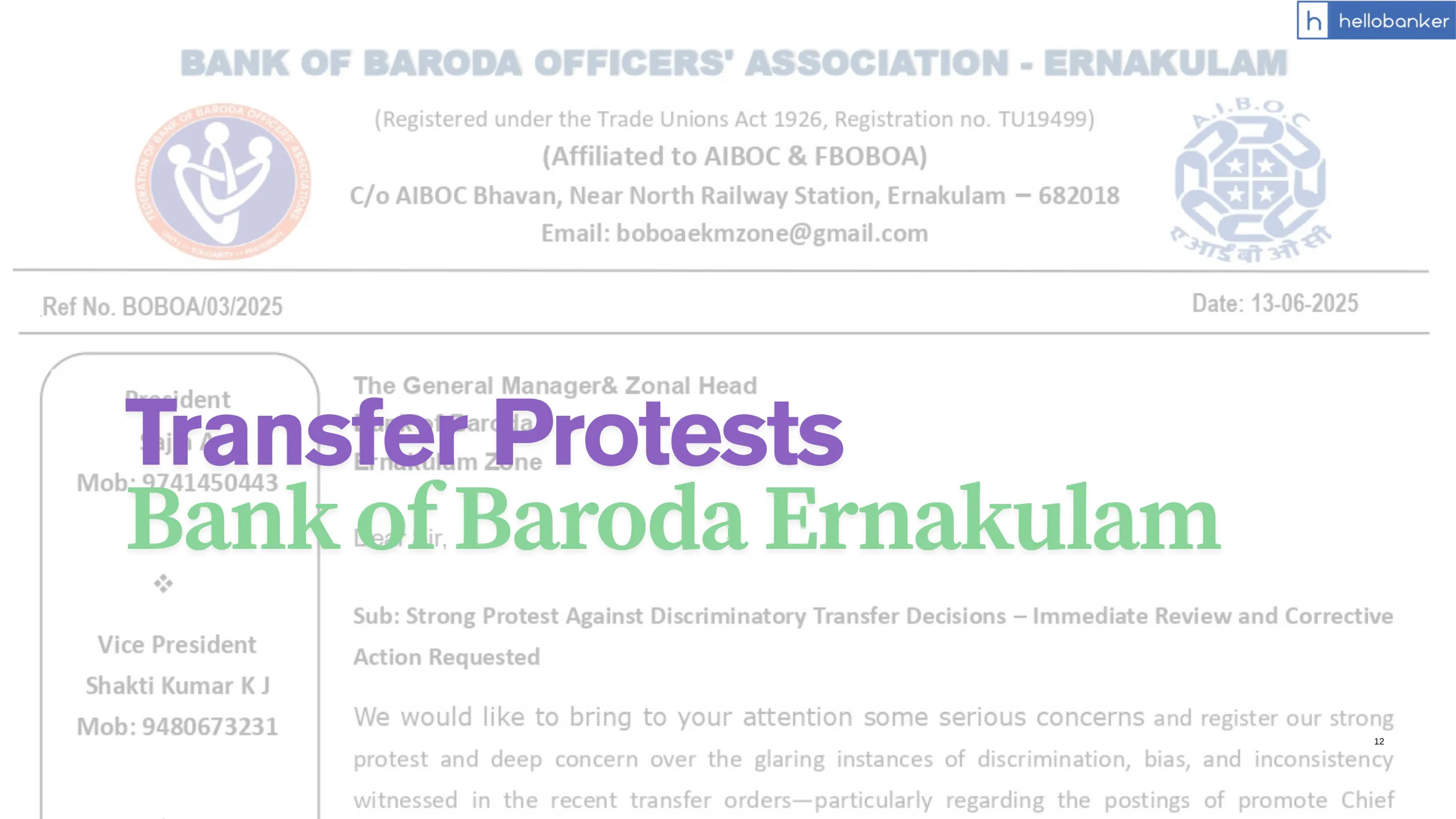| ➡️ Get instant news updates on Whatsapp. Click here to join our Whatsapp Group. |
Bank of Baroda Officers are protesting against Discriminatory Transfers in Ernakulam Zone. The officers’ association has written a letter to Zonal Head in Ernakulam and demanded immediate review of transfers. The letter and details are given below.
Letter to Zonal Head from Officers’ Association
To:
The General Manager & Zonal Head
Bank of Baroda
Ernakulam Zone
Subject: Strong Protest Against Discriminatory Transfer Decisions – Immediate Review and Corrective Action Requested
We would like to bring to your attention some serious concerns and register our strong protest and deep concern over the glaring instances of discrimination, bias, and inconsistency witnessed in the recent transfer orders—particularly regarding the postings of promote Chief Managers and officers under Inter-Zonal Transfer (IZT) and Inter-Regional Transfer (IRT) exercises.
It is deeply disappointing and demoralizing to observe that certain promoted Chief Managers have been conveniently accommodated within the same City/District/Region, despite having completed more than five years of tenure at the same location. In sharp contrast, others have been transferred to distant and inconvenient locations, without any objective justification or parity. This clear deviation from established guidelines not only violates the principle of fairness but has also created widespread dissatisfaction among the officer fraternity.
Adding to the discontent, officers in Scale I to III have been subjected to IRT even before completing the tenure of four years. Such arbitrary and selective implementation of IRT is highly unjustified, sending a message of unfair treatment and raising serious questions on the transparency and intent behind such decisions.
We strongly condemn the arbitrary and non-transparent intra-regional transfers initiated by Mr. Anilkumar Nair P, Regional HR, Trivandrum. These transfers have been carried out without any adherence to uniform guidelines or approved policy framework and appear to be based solely on personal discretion and favoritism. The selective granting of exemptions to individuals with personal affiliations, while ignoring genuine cases of hardship and valid inter-regional exemptions, is a blatant misuse of authority. This biased and inconsistent approach has severely eroded employee morale, trust, and the credibility of the administrative process. It is alarming that Mr. Anil has a history of such actions, which continue to damage the integrity of the Region and Zone.
Moreover, several genuine exemption requests under IZT/IRT—based on critical and compassionate grounds such as serious health conditions, children’s education, and responsibilities toward aged dependents—were summarily rejected. In stark contrast, exemptions were granted to officers with comparatively less pressing concerns. This selective and biased treatment is a blatant violation of DFS guidelines and raises serious questions about transparency, fairness, and accountability in the transfer process. These arbitrary decisions have led to widespread frustration, demoralization, and a deep sense of alienation among the affected officers.
Furthermore, while implementing the IRT, the legitimate and reasonable request to consider posting officers to adjacent regions clearly communicated during discussions was completely ignored. It is also highly concerning that officers transferred under IRT are now expected to serve for 3 to 4 years in the respective regions, and thereafter undergo an additional 3-year tenure under IZT. This effectively results in a prolonged displacement of officers from their home Regions, causing severe disruption to their personal and professional lives and is an issue that demands immediate review and rectification.
We expect prompt corrective action to uphold the principles of justice and to restore the morale of our officer community. Failing which, the Association will be compelled to intensify its protest through all appropriate organizational and democratic means.
